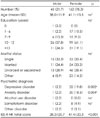Abstract
Objectives
This study was conducted to translate the Impact of Event Scale-Revised (IES-R) into North Korean language and confirm its reliability and validity.
Methods
A total of 207 North Korean defectors recruited from the Call Center for North Korean Defectors participated in this study. Psychiatrists and psychiatric residents interviewed the participants individually and made psychiatric diagnosis. Subsequently, they completed the Brief Psychological State Inventory for North Korean Refugees (BPSI-NKR), the Center for Epidemiologic Studies Depression Scale-North Korea (CES-D-NK), and the Alcohol Use Disorders Identification Test-North Korea (AUDIT-NK) as well as the Impact of Event Scale-Revised-North Korea (IES-R-NK). Of the original participants, 143 subjects participated in test-retest reliability study after one week.
Results
The internal consistency using Cronbach's α was superior in both male and female from North Korea. In addition, the temporal stability was also satisfactory. A good convergent validity was clearly shown by significant correlations with BPSI-PTSD and CES-D-NK, respectively. On the other hand, IES-R-NK had no or weak correlations with AUDIT-NK and BPSI-NKR-alcohol, demonstrating its satisfactory discriminant validity.
Figures and Tables
Table 3
Correlations of total scores of each scale with total score of the IES-R-NK (n=207)

*: p<0.05, **: p<0.01. AUDIT-NK : Alcohol Use Disorders Identification Test-North Korea, BPSI-NKR : Brief Psychological State Inventory for North Korean Refugees, CES-D-NK : Center for Epidemiologic Studies Depression Scale-North Korea, IES-R-NK : Impact of Event Scale-Revised-North Korea, PTSD : posttraumatic stress disorder
References
1. Unikorea.go.kr [homepage on the Internet]. Statistics-North Korean refugee policy 2014. Seoul: Ministry of Unification;cited 2014 Dec 23. Available from: http://www.unikorea.go.kr/content.do?cmsid=1518.
2. Jeon WT, Yoon DY, Um JS. The way of thinking and satisfaction level of North Korean defectors in South Korea. J Korean Neuropsychiatr Assoc. 2004; 43:93–104.
3. Shin HK, Kim HK, Lim JY. Development of the Brief Psychological State Inventory for North Korean Refugees (BPSI-NKR). Korean J Clin Psychol. 2010; 29:777–798.

4. Lee SH. Development of psychiatric treatment model for North Korean defectors [Internet]. Seoul: National Medical Center;2012. cited 2014 Dec 22. Available from: http://goo.gl/MLafpO.
5. Kang SR. Development of trauma scale for North Korean refugee [dissertation]. Seoul: Yonsei University;2001.
6. Jeon WT, Yu SE, Cho YA, Eom JS. Traumatic experiences and mental health of North Korean refugees in South Korea. Psychiatry Investig. 2008; 5:213–220.

7. Han NY, Kim SJ, Jun JY, Won SD, Yoo SY, Lee SH. Predictors of PTSD among North Korean defectors visited psychiatric department: North Korean defectors treatment center survey. J Korean Neuropsychiatr Assoc. 2015; In press.
8. Jeon W, Hong C, Lee C, Kim DK, Han M, Min S. Correlation between traumatic events and posttraumatic stress disorder among North Korean defectors in South Korea. J Trauma Stress. 2005; 18:147–154.

9. Oh SI, Won SD, Lee SH, Yoo SY, Kim HC, Kim HJ. Reliability and validity of the Korean Version of the PTSD Checklist Civilian Version in North Korean defectors. J Korean Neuropsychiatr Assoc. 2014; 53:410–417.

10. Kim BC, Jeong SH, Rim HD, Choi JH, Jeon JH, Jeon YW. Natural Killer Cell Activity in North Korean Defectors with PTSD. J Korean Neuropsychiatr Assoc. 2008; 47:481–487.
11. Yoon YS, Kim HA, Han SY. Validation and development of a posttraumatic stress symptom scale for dislocated North Koreans in South Korea. Korean J Couns Psychother. 2007; 19:693–718.
12. Weiss DS, Marmar CR. The impact of event scale-revised. In : Wilson JP, Keane TM, editors. Assessing psychological trauma and PTSD. New York: Guilford Press;1997. p. 399–411.
13. Horowitz M, Wilner N, Alvarez W. Impact of Event Scale: a measure of subjective stress. Psychosom Med. 1979; 41:209–218.

14. Eun HJ, Kwon TW, Lee SM, Kim TH, Choi MR, Cho SJ. A study on reliability and validity of the Korean Version of Impact of Event Scale-Revised. J Korean Neuropsychiatr Assoc. 2005; 44:303–310.
15. Blake DD, Weathers FW, Nagy LM, Kaloupek DG, Gusman FD, Charney DS, et al. The development of a Clinician-Administered PTSD Scale. J Trauma Stress. 1995; 8:75–90.

16. Radloff LS. The CES-D scale a self-report depression scale for research in the general population. Appl Psychol Meas. 1977; 1:385–401.
17. Cho MJ, Kim KH. Diagnostic validity of the CES-D (Korean Version) in the assessment of DSM-III-R major depression. J Korean Neuropsychiatr Assoc. 1993; 32:381–399.
18. Babor T, de la Fuente J, Saunders J, Grandt M. AUDIT - the alcohol use disorders identification test: guidelines for use in primary health: guidelines for use in primary health care. Geneva: World Health Organization;1989.
19. World Health Organization. Mental and behavioral disorders (F00-F99). The International Classification of Diseases. 10th, rev. Geneva: World Health Organization;1992.
20. Bohn MJ, Babor TF, Kranzler HR. The Alcohol Use Disorders Identification Test (AUDIT): validation of a screening instrument for use in medical settings. J Stud Alcohol. 1995; 56:423–432.

21. Kim JS, Oh MK, Park BK, Lee MK, Kim GJ, Oh JK. Screening criteria of alcoholism by alcohol use disorders identification test (AUDIT) in Korea. J Korean Acad Fam Med. 1999; 20:1152–1159.
22. Kline P. A handbook of test construction: Introduction to psychometric design. London: Methuen;1986.
23. Cohen J. Statistical power analysis for the behavioral sciences. 2nd ed. Hillsdale: Erlbaum;1988.




 PDF
PDF ePub
ePub Citation
Citation Print
Print




 XML Download
XML Download